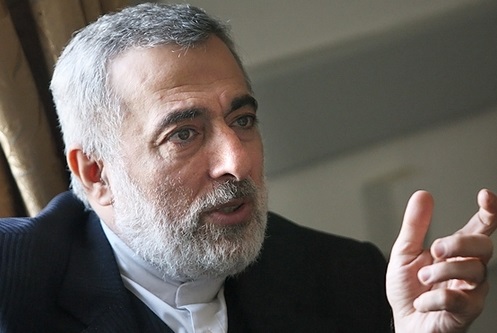
RNA - "The Americans have for years been attempting to influence in Syria but all their efforts have failed. All ways have been closed to the Americans to prove their effectiveness after failure to overthrow the Syrian government and defeats in Aleppo and recently in Eastern Ghouta," Sheikholeslam, the former Iranian envoy to Syria, said on Wednesday.
"The Americans may intensify military acts in Syria and attack the country but we think that although such measures are destructive, they will have no effect on the ground and the political scene," he added.
"The US military attack against Syria can turn into their last and ultimate defeat in the country," Sheikholeslam said.
His remarks came after Trump in a post on his twitter page blamed Damascus for the terrorists' false-flag chemical attack in the town of Douma in Eastern Ghouta and threatened Syria with military action. Trump also took Iran and Russia responsible for the chemical attack by supporting Damascus.
Iranian Foreign Minister Mohammad Javad Zarif lashed out at Trump for threatening Syria with military action, warning that such threats are aimed at assisting extremist groups.
"Trump's cheap shot against Iran, which has consistently condemned use of chemical weapons by anyone and is itself the victim of their use by Saddam with US support, is hypocritical," Zarif wrote on his twitter page in response on Tuesday.
"His threat to repeat impulsive acts of aggression is symptomatic of US policy helping extremists," he added.
In relevant remarks late last week, Iranian Foreign Ministry Spokesman Bahram Qassemi strongly condemned the use of chemical weapons by any country in any part of the world, and dismissed the use of such weapons by the Syrian government in Eastern Ghouta.
"Claims about a chemical attack by the Syrian government in Eastern Ghouta are conspiratorial and illogical," Qassemi said.
"Such claims and accusations by the Americans and some Western countries signal a new conspiracy against the Syrian government and nation and a pretext for military action against them," he added.
The Iranian foreign ministry spokesman underlined that using such allegations as a pretext for a military intervention in Syria would "certainly aggravate the situation in this country and in the region".
"The terrorists would be emboldened by any act of aggression which would not be in favor of peace, stability and security in the region and across the world," Qassemi said.
Qassemi further said the Islamic Republic, in line with its principle policies and religious teachings and as a victim of chemical weapons itself, denounces the use of chemical weapons in any part of the world.
According to Fars News Agancy, he added that the alleged chemical attack in Eastern Ghouta is not in conformity with the realities on the ground because the Syrian government has had appropriate cooperation with the United Nations.
Qassemi's comments came a few hours after militants and activists linked to them, including the so-called civil defense group White Helmets, claimed that government forces on Saturday had dropped a barrel bomb containing poisonous chemicals in Douma, Eastern Ghouta’s largest town, killing and wounding dozens of civilians.
Damascus, in a statement released late on Saturday, strongly rejected the allegation and said that the so-called Jaish al-Islam Takfiri terrorist group, which has dominant presence in the town, was repeating the allegations of using chemical munitions “in order to accuse the Syrian Arab army, in a blatant attempt to hinder the Army’s advance.”
"The chemical fabrications, which did not serve the terrorists and their sponsors in Aleppo and Eastern Ghouta, will not serve them today either, as the Syrian state is determined to end terrorism in every square inch of Syrian territory," read the statement.
Syria surrendered its stockpiles of chemical weapons in 2014 to a joint mission led by the US and the Organization for the Prohibition of Chemical Weapons (OPCW), which oversaw the destruction of the weaponry. Damascus has consistently denied using chemical weapons over the past years of conflict in the country.
Western governments and their allies, however, have never stopped pointing the finger at Damascus whenever an apparent chemical attack takes place.
847/940